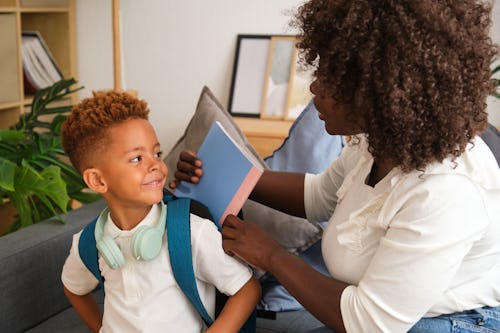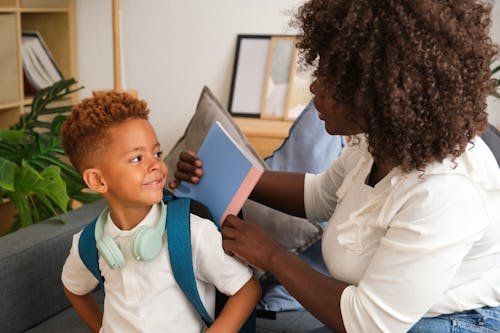
Look, let’s just say it — watching a kid struggle to complete a task that you just know you could do in five seconds flat can be a wee bit frustrating. If you don’t think too much about how often you step in, it can be quite easy to become a helicopter parent.
It’s not uncommon, but a new Yale study suggests that we may want to rethink frequent intervention — and that a simple mindset shift might help us to do just that.
Published in Child Development, the study suggests that helicopter parenting, or as the researchers refer to it, “overparenting,” can be reduced when parents adopt a focus on learning opportunities — and this can have longterm positive impacts on your kid’s life.
“Overparenting — taking over and completing developmentally appropriate tasks for children — is pervasive and hurts children’s motivation,” the study explains.
Previous research has linked overparenting behavior to worse mental health, self-regulation, and reduced motivation in children.
Nobody wants to claim the label of “helicopter parent” — but whether or not we want to admit it, it’s easy to fall into that pattern of behavior. If you have a habit of tying your kid’s shoes, or being a little too helpful with their homework, you might be guilty of it.
So, why do we do it? Well, the study explains that overparenting is more common in countries with greater income inequality and higher stakes for receiving an education. Researchers theorize that parents in these cultures are more likely to step in and take over tasks for their children because they place a greater priority on the outcome of the task, rather than the learning process.
The researchers wanted to find out if overparenting could be reduced with something as simple as a mindset shift in parents — what would happen if parents started framing everyday tasks as learning opportunities?
To test this theory, the team conducted three studies. In the first, parents self-reported their own perception of their child’s learning, and their own tendency to take over tasks. The task they said they take over the most? Getting dressed. Relatable.
The first study included 77 parents of 4-5 year olds from across the United States.
In the second and third studies, the researchers then tested whether framing a non-academic task — in this case, getting dressed — as a learning opportunity would reduce parent overreach.
The researchers recruited 60 pairs of parents and children for the second study, and 80 pairs for the third, at a children’s museum in Philadelphia, and asked them to put on hockey gear to play a game.
In the second study, parents in the control group were told that putting on hockey gear could “gain a deeper interaction with the museum.” Meanwhile, other parents were told that children could gain important skills, like problem-solving and confidence, by putting on the gear. While these parents still stepped in to help at some points, they did so significantly less than the control group, showing that adopting a learning mindset led to less overparenting.
In the third study, the researchers tested wether the magnitude of the learning opportunity affected the degree of overparenting. This time, one group of parents was told that their kids could learn highly valuable life skills — problem solving and self-confidence — while the other group was told they could learn less valuable skills — knowledge of the equipment they were wearing. In this case, parents stepped in at similar low rates, suggesting that the perceived importance of the subject doesn’t have much of an affect on their intervention.
The researchers recognized the studies’ limitations: they recognized that overparenting could be the result of goals other than children’s learning, such as obligation or safety concerns. They also pointed out that overparenting could be more present when families are under time constraints, which they didn’t face in the museum setting.
Despite the limitations, the researchers maintained that their study showed that a change in perspective was helpful in reducing overparenting.
“These findings suggest that the next time caregivers find themselves tempted to complete a task for a child, they should take a moment to appreciate all that children could learn from trying to do it on their own,” the study concluded.
So, next time you find yourself tying your kids’ shoes, maybe take it as an opportunity to teach them more than just the bunny ear method. When you believe your kid is capable of hard things, they believe that of themselves, too — and that’s a skill that sets them up for life.
Disclaimer: This story has not been edited by us and is published as shown on Scary Mommy.


Leave a Reply